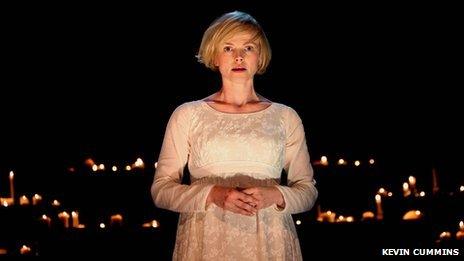The Masque of Anarchy: Shelley's poem is 'slogan for modern times'
- Published

Maxine Peake will be performing the poem close to the site of the Peterloo Massacre
As globally-sourced as the programme of the Manchester International Festival is, there are elements born and bred in the city.
Perhaps the strongest is the performance of Percy Bysshe Shelley's The Masque of Anarchy, by Bolton actor Maxine Peake, as it is being recited yards from where the horrors that inspired it took place.
Shelley wrote the poem about the events of 16 August 1819, when cavalrymen charged reform campaigners in St Peter's Field, leaving 15 dead and 700 injured.
It was dubbed the Peterloo Massacre and so shocked the poet that he was compelled to pen his protest despite living in Italy.
'Purrs and growls'
The University of Salford's Shelley scholar, Dr Alison Morgan, said Peterloo was "important to him because he opposed repression of the people".
"He loathed the government and was himself under investigation before he left for the continent.
"Peterloo epitomised the brutality of the government but also provided some hope that a revolution or at least some form of mass protest would occur.
"Masque isn't the only poem he wrote in response to Peterloo - his outrage lasted until the following spring and he hoped that a volume of these poems would be published."
Despite that desire, she said the chances of such a volume appearing were slim, not least because Shelley was "a bit snooty".
"Shelley sent Masque to Leigh Hunt in September 1819 but knew he wouldn't publish it.
"It's not known why Shelley didn't send it to other radical publishers, [but] my view is that he was a bit snooty when it came to the radical weeklies."
The Masque was eventually published in 1832, the year the Reform Act which granted the vote to male small landowners, tenant farmers, and shopkeepers was passed.
For poet and Manchester Metropolitan University lecturer Adam O'Riordan, the "most compelling thing" about the poem is how it came to be.
"I love the idea of Shelley sitting in a room in sun-drenched Italy and being shocked into poetry by the letter he receives telling him about the events in Manchester."
He said it still resonated with the modern world because "it purrs and growls and beats with the authentic rhythms of dissent and unrest and in doing so captures the spirit of our city".
"It remains a searingly powerful call to action and a soothing appeal for unity.
"Consider the line 'Ye are many, they are few'; can you think of a more apt or fitting slogan for the times we're living through now?"
'Hard-won democracy'
Paul Fitzgerald, who chairs a campaign to have a permanent Peterloo memorial erected in Manchester, said the poem's modern relevance lay in the fact it "reminds us of the sacrifices that people went through to push for the vote".
"When you consider what people did and how brave they were, walking past armed soldiers knowing that they had been declared illegal and how the state had behaved before, it begs the question as to whether we are looking after our hard-won democracy?"
He said the performance at MIF was another step in the ever-growing interest in Peterloo, something he said did not come as a surprise when global events were considered.
"You've got people pushing for democracy across the world in Egypt and so forth, and they're basically going through the same thing we went through in Manchester and England.
"It's so easy to take democracy for granted and we forget what a struggle it was to obtain it in the first place."
'A defence of love'
For Dr Morgan, the enduring power lies in what The Masque describes.
"The poem is a reminder of Peterloo and a vivid depiction of England at the time.
"Peterloo has been compared with Bloody Sunday in terms of its significance and Shelley recognised how seminal an event it was.
"Masque has been described as the greatest poem of political protest written in English, which, I think, justifies it still being studied.
"In the age of increasing government surveillance and the erosion of civil liberties, it is a timely reminder of how governments are not averse to attacking its own people."
For Mr O'Riordan though, it endures for more than simply political reasons.
He said Shelley captured something that has continued to be a source of inspiration in the city - "that primary value, love".
"Remember painted on the banners of the protesters who walked into Manchester on that summer morning were not just the words Reform, Universal Suffrage and Equal Representation, but also the word Love.
"That still flourishes here - from the Stone Roses singing about it to Carol Ann Duffy penning poems on it, love is the sound our city makes.
"The Masque, with all its brooding, brawling power, will always be an outraged cry against that value being trampled on.
"In short, it's a defence of love."
The Masque of Anarchy is performed at Albert Hall on Peter Street until Sunday 14 July.
- Published10 July 2013
- Published7 July 2013
- Published6 July 2013
- Published5 July 2013
- Published4 July 2013
- Published1 July 2013
- Published19 June 2013
- Published28 February 2013
- Published16 August 2012